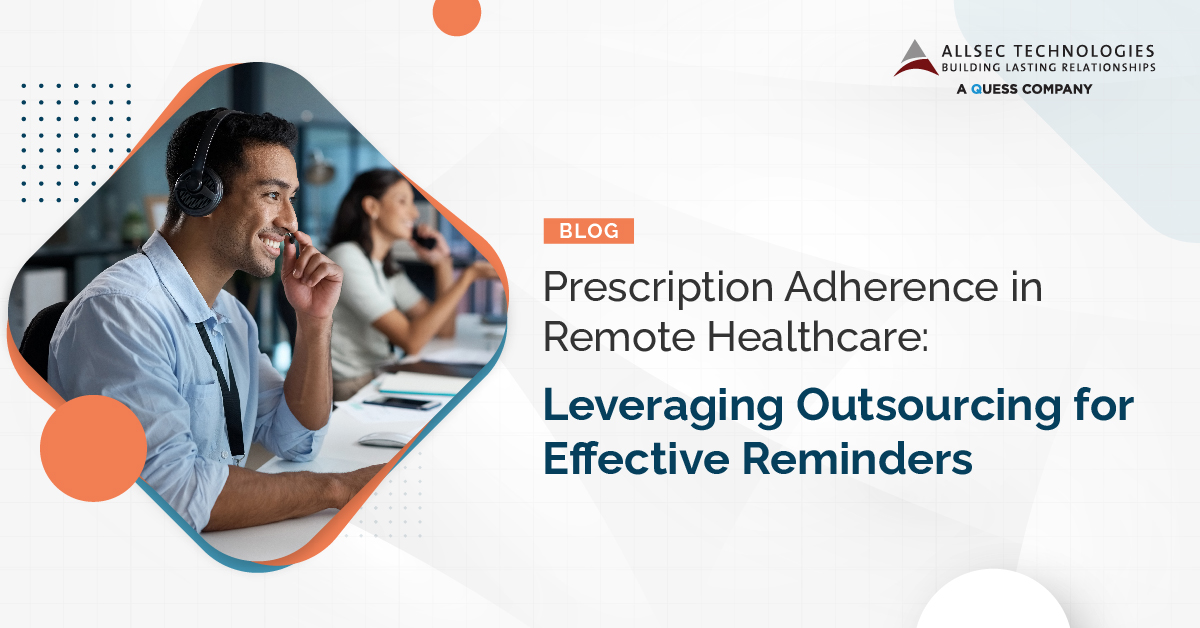
The rise of remote healthcare has democratized access to care, but it also throws a wrench in medication adherence. Patients, physically distanced from providers, often struggle to maintain their regimens, with rates plummeting as low as 50%. This translates to suboptimal health outcomes, skyrocketing costs, and a frustrated healthcare system. According to a survey done by Deloitte, Health care delivery and health management will look significantly different by 2040.
But this is where smart reminders, strategically deployed, can bridge the gap and transform the landscape. In this blog, find out how e-prescriptions and outsourcing can play a crucial role in bolstering prescription adherence in remote healthcare scenarios.
The Current Conundrum
Imagine patients handling complex medication schedules, grappling with side effects, and facing limited communication channels. Added to this are the cultural nuances and socioeconomic barriers, and the adherence puzzle becomes even more intricate. Here’s what drives low rates in remote care:
- Lack of in-person touch: Missed clinic cues and physical reminders leave patients adrift.
- Medication maze: Confusing instructions, multiple meds, and side effects can overwhelm adherence.
- Communication chasm: Distance and fear of inconvenience deter patients from reaching out.
- Socioeconomic hurdles: Technology access, transportation woes, and financial strains present roadblocks.
Empowering Solutions
By partnering with specialized service providers, healthcare organizations can implement tailored solutions to bolster prescription adherence. Here’s how:
- Electronic Health Records (EHR): They have revolutionized the way healthcare providers manage patient information and streamline processes. Within these systems lies the capability to deliver e-prescriptions seamlessly. This digital shift offers numerous advantages over traditional paper prescriptions, including enhanced accuracy, efficiency, and accessibility.
- Building a support bridge: Empathetic, trained healthcare professionals act as dedicated guides, troubleshooting concerns, answering questions, and offering moral support, often through services like Medication Therapy Management (MTM, billable under CPT codes 99605-99606).
- Harnessing data’s wisdom: By analyzing medication usage patterns, we can identify potential pitfalls before they become chasms, allowing for proactive interventions and personalized nudges. This aligns with the goals of Remote Therapeutic Monitoring (RTM, supported by CPT code 98975).
- Personalized Reminder Systems: Outsourced providers can develop personalized reminder systems tailored to individual patient needs. These reminders can be sent via SMS, email, or app notifications, serving as gentle nudges to take medications as prescribed.
- Behavioral Insights and Analysis: Leveraging data analytics, outsourced firms can provide valuable insights into patient behavior patterns. By understanding why patients may forget or choose not to adhere to their prescriptions, healthcare providers can implement targeted interventions to address underlying issues effectively.
- Multichannel Communication: Not all patients respond to the same communication channels. Outsourced services can deploy a multichannel approach, reaching patients through their preferred mediums, whether it’s through text messages, automated voice calls, or even interactive apps.
- 24/7 Support: Remote healthcare knows no bounds of time zones or working hours. Outsourced support can offer round-the-clock assistance, ensuring patients have access to support whenever they need it, thereby fostering a sense of reliability and trust.
- Medication Refill Management: Beyond initial prescriptions, outsourced providers can assist in managing medication refills. Timely reminders for refills coupled with seamless coordination with pharmacies ensure patients don’t experience interruptions in their treatment plans.
- Cultural and Linguistic Sensitivity: In diverse healthcare landscapes, understanding cultural nuances and linguistic preferences is paramount. Outsourced services can cater to various cultural backgrounds and languages, ensuring communication is effective and inclusive.
Beyond Numbers
By harnessing the power of outsourcing in conjunction with EHR capabilities, healthcare providers can elevate prescription adherence to new heights, even in the most remote settings. However, it’s essential to recognize that successful implementation requires collaboration, transparency, and a patient-centric approach. Given the complexities of modern healthcare delivery, embracing innovative solutions like outsourcing for prescription adherence not only enhances patient outcomes but also reaffirms our commitment to delivering comprehensive and compassionate care, regardless of geographical barriers.


